Belfast is the capital city of Northern Ireland. It is a fascinating place with a long and often tragic history. Millions of people visit the city every year and there is always plenty there to keep them busy.
Tourists can enjoy the wide range of attractions on offer, such as the Titanic Quarter, the Ulster Museum, Belfast Zoo, many examples of public art and of course the fantastic pubs and bars that offer a variety of fantastic live music.
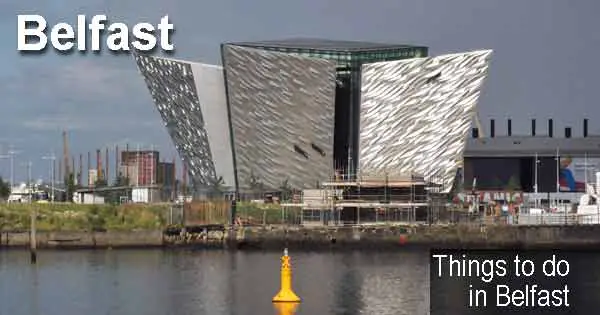
Further afield there is wonderful open countryside with stunning views. The coastal road along the northern sea front, culminating in the famous Giant’s Causeway, has been voted one of the most picturesque drives in the world.
The conflict between the Catholic Nationalists and the Protestant Loyalists has played a prominent part in the history of Belfast. Visitors can get a real feel of the tensions by taking a tour of the different areas and seeing the murals of both sides on the walls of the estates.
Titanic Quarter
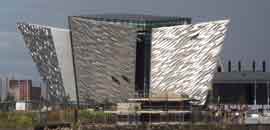 Belfast is famous across the world as the city where the Titanic was built. In 2012, the Titanic Belfast building was opened to mark the 100th anniversary of the ship’s doomed maiden voyage.
Belfast is famous across the world as the city where the Titanic was built. In 2012, the Titanic Belfast building was opened to mark the 100th anniversary of the ship’s doomed maiden voyage.
It is a striking building with fascinating exhibitions inside. Elsewhere in the Titanic Quarter, tourists can visit the Titanic Pump-House and see the iconic cranes, Samson and Goliath.
Murals on the Shankill Road and Falls Road
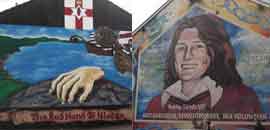 The Shankill Road and the Falls Road are two neighbouring estates in West Belfast that are still segregated.
The Shankill Road and the Falls Road are two neighbouring estates in West Belfast that are still segregated.
The Protestants of Shankill Road and the Catholics of Falls Road spent years in conflict with each other and there is still an air of tension in the areas.
Both sides have several murals on the buildings and tourists can take bus or taxi tours to get a better understanding of the areas.
More on Shankill and Falls Roads
Europa hotel
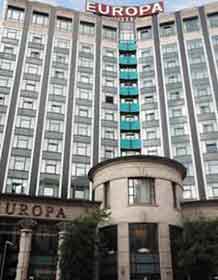 The Europa Hotel opened in 1971 and during the Troubles in Northern Ireland, it became the most bombed hotel in Europe. However, the hotel always recovered and carried on with business. They adopted the motto ‘We never close’.
The Europa Hotel opened in 1971 and during the Troubles in Northern Ireland, it became the most bombed hotel in Europe. However, the hotel always recovered and carried on with business. They adopted the motto ‘We never close’.
With typical Belfast defiance, the hotel even began selling memorabilia such as T-shirts declaring ‘I stayed in the Europa during the Troubles’ to their guests.
It was where President Clinton stayed when he visited Belfast in 1998 and the room he stayed has since been renamed the Clinton Suite.
Today it still stands proud in the heart of the city and is certainly worth a visit when in Belfast. If not to stay the night then just to look at the time line of pictures on the walls or have a meal and a drink in one of the bars.
Belfast Zoo
 There are over 1,000 animals in Belfast Zoo, many of which are endangered in their natural habitat.
There are over 1,000 animals in Belfast Zoo, many of which are endangered in their natural habitat.
Visitors can see lions, elephants, giraffes, monkeys, kangaroos and many other species. The different areas of the zoo include the Rainforest House which features fruit bats and whistling ducks, the Bird Park which contains several exotic species, the Giraffe and elephant enclosure which as well as giraffes and elephants, also features meerkats, zebras, ostriches and porcupines.
There is also a stunning lakeside area and several beautiful gardens. The Lake side has a farm and is home to animals such as cranes, flamingos and sitatunga.
The numerous gardens contain a variety of trees and plants. Many of the plants have been added to help to replicate the natural habitat of some of the animals.
Belfast Castle
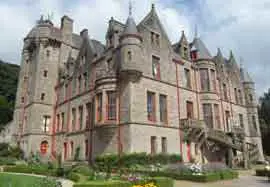 Belfast Castle is a magnificent building that was built between 1811-70 after the original castle burned down.
Belfast Castle is a magnificent building that was built between 1811-70 after the original castle burned down.
In 1934, the 9th Earl of Shaftsbury presented the castle to the city of Belfast. The castle was opened to the public after a decade of refurbishment
Today it is used for ceremonies such as weddings and civil partnerships and many couples also hold their reception at the castle. Many businesses also use the conference and function rooms.
Tourists can have a meal at the castle and enjoy live traditional folk music. There is also a great view of the city from the grounds.
Botanic Gardens
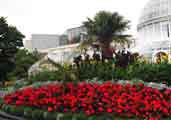 Belfast’s Botanic Gardens feature several beautiful flower displays as well as two buildings, The Palm House and the Tropical Ravine.
Belfast’s Botanic Gardens feature several beautiful flower displays as well as two buildings, The Palm House and the Tropical Ravine.
Both buildings were built in the 1800s and are home to exotic and tropical plant life.
The Ulster Museum
 The Ulster Museum contains several collections on a number of subjects such as art, history or science. There are a number of fascinating permanent exhibitions and their temporary displays are always popular as well.
The Ulster Museum contains several collections on a number of subjects such as art, history or science. There are a number of fascinating permanent exhibitions and their temporary displays are always popular as well.
Belfast City Hall
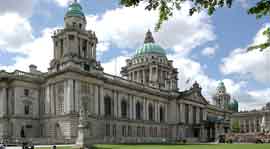 Belfast City Hall was built after Belfast was granted city status. It is a magnificent building where council members sit and discuss the issues of the day.
Belfast City Hall was built after Belfast was granted city status. It is a magnificent building where council members sit and discuss the issues of the day.
Visitors can take a tour of the building and see the many magnificent halls with striking stained glass and carved oak features.
Belfast pubs and live music
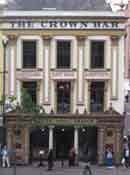 There is a rich variety of nightlife available in Belfast. As well as the numerous restaurants, there are plenty of great bars where visitors can relax and let their hair down.
There is a rich variety of nightlife available in Belfast. As well as the numerous restaurants, there are plenty of great bars where visitors can relax and let their hair down.
Belfast’s most famous pub, the Crown Bar is worth a visit but Belfast has many more to cater for all different tastes. Several pubs have live traditional Irish music every night.
Culture Northern Ireland
For more information on what is happening in Belfast check out Culture Northern Ireland.
Culture Northern Ireland is Northern Ireland’s leading arts and cultural website, covering music, film, literature, heritage, sport, dance, theatre, the visual arts and much more besides.
With thousands of articles, features, Q&As, reviews, profiles, multimedia content and NI’s most comprehensive event listings, Culture NI is the flagship digital project of the Nerve Centre, and a unique and exciting resource for arts information and arts marketing.
Big Fish
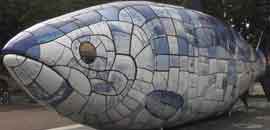 In 1999, there was a sculpture of a ‘big fish’ added to the bank of the River Lagan. The blue and white fish is 10 metres long and was made by John Kindness to celebrate the regeneration of the river.
In 1999, there was a sculpture of a ‘big fish’ added to the bank of the River Lagan. The blue and white fish is 10 metres long and was made by John Kindness to celebrate the regeneration of the river.
The scales of the fish are made of ceramic tiles and each one contains images or text relating to an episode of Belfast’s history. The text and images on the scales were provided by the Ulster museum, the local schools and also taken from newspaper headlines.
It is situated at the Lagan Lookout, near Custom House Square in the popular Cathedral Quarter.
Monument to the unknown woman worker
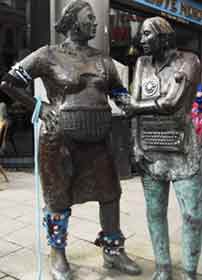 The women of Belfast have always played key role in the working life of the city. In 1992, artist Louise Walsh, created a monument to the women workers of Belfast. The monument was of two female figures and highlighted the issues of low paid employment and unpaid house work.
The women of Belfast have always played key role in the working life of the city. In 1992, artist Louise Walsh, created a monument to the women workers of Belfast. The monument was of two female figures and highlighted the issues of low paid employment and unpaid house work.
The women have a number of objects on their person such as a cash register, telephone and shopping basket. Originally the commissioners had wanted two colourful ‘cartoon’ female figures to represent the old red light district around Amelia Street but Walsh objected. She believed it was offensive to portray women in such a way and that it was more important to highlight the issues of women’s low pay.
The monument is outside the famous Europa hotel.
Beacon of Hope sculpture
![]() The Thanksgiving Statue stands 64 feet tall in Thanksgiving Square. It is also known as the Beacon of Hope and was built in 2006.
The Thanksgiving Statue stands 64 feet tall in Thanksgiving Square. It is also known as the Beacon of Hope and was built in 2006.
The sculpture is of a female figure reaching to the sky. She is stood on top of a globe and is holding a large ring, known as the ‘ring of thanksgiving’.
The globe that the figure stands on represents the universal philosophy of peace, harmony and thanksgiving. It also highlights the countries to which Belfast people have migrated and to which companies have exported their products.
It is made of stainless steel and cast bronze by Andy Scott. Locals have given the sculpture a number of nicknames including ‘the thing with the ring’, ‘the Nuala with the hula’ and ‘the belle on the ball’.
Albert Memorial Clock Tower
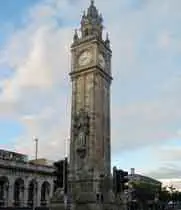 The Albert Memorial Clock Tower was built between 1865-69. It was commissioned following the death of Queen Victoria’s husband, Prince Albert.
The Albert Memorial Clock Tower was built between 1865-69. It was commissioned following the death of Queen Victoria’s husband, Prince Albert.
The Tower is in Queen’s Square and stands 113 feet tall. There is a statue of Prince Albert on the west side of the tower.
Van Morrison’s birthplace
Fans of rock star Van Morrison might like to visit the house where he was born. It is 125 Hyndford Street and has a plaque on the wall.
Unfortunately, the house isn’t open to visitors but fans can take a walk around his old neighbourhood and see some of the places he mentions in his songs such as St Donald’s Church and Cypress Street. You can get a feel of the atmosphere of the area that provided the foundation of his music.
Oh Yeah Music Centre
The Oh Yeah centre is home to the Oh Yeah charity. It aims to ‘Open doors to music potential. They provide affordable rehearsal space to young bands and regularly stage live events.
Artists such as The Undertones, Elbow, Two Door Cinema Club, Ash and Gary Lightbody have performed at the centre. There is also a permanent music exhibition which pays homage to the stars of Irish rock music.
More top attractions in Ireland
Galway named as one of the ‘best trips’ in the world by top American travel magazine